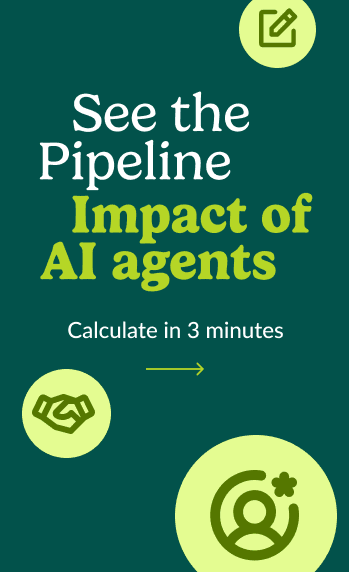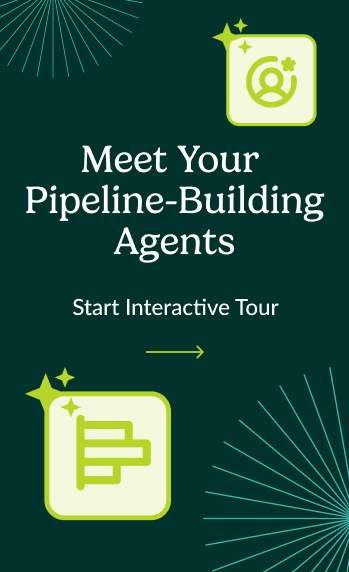AI Marketing
Published:

Among revenue teams, AI marketing is booming.
That’s because marketing and sales teams have the most to gain from AI.
According to McKinsey, global marketing and sales teams can use AI to unlock up to $6 trillion in annual value. In fact, in the same report, 74% of marketing and sales respondents reported a revenue increase with AI adoption.
In short, marketers who adopt AI are bound to profit. So, will your company take a large share of the profitability pie? Or will your competitors be the ones to transform into the AI experts, leaving you behind?
Good news: We’re tipping the odds in your favor.
In this guide, we dive into the top use cases, benefits, and challenges of AI marketing alongside examples to help your marketing team take the big leap into artificial intelligence (AI) adoption.
Ready to learn?
What Is AI Marketing?
AI marketing is the practice of using artificial intelligence software and strategies to enhance your marketing efforts. With AI marketing, you can make more informed decisions by analyzing massive sets of data, create digital marketing assets at a faster rate, and automatically personalize experiences to match your buyers’ interests, goals, and needs.
Not only is AI marketing essential if you want to enhance your buying experience — it’s also exactly what your customers want. Personalization, speed, and responsiveness are top-of-mind for today’s buyers and customers. And by implementing AI, you can make the entire customer experience more convenient and relevant for them.
Plus, what’s good for your customers is good for you too. 51% of marketers say AI is either very important or critically important to their marketing success over the next 12 months.
Types of Marketing AI
While there are endless uses and tools for marketing with AI, for the most part, AI marketing can be broken down into three main categories:
- Big data and predictive AI: With AI, you can use large sets of accurate, up-to-date data to analyze patterns of behavior, make predictions, and get better results from marketing campaigns. Done right, you can draw on first-party data (which, unlike third-party data, is data that customers share willingly with you) to better understand your customers and make even more informed, data-driven decisions.
- Generative AI: This type of marketing AI is all about production. From text to images to code and beyond, generative AI allows you to produce new content for marketing quickly and accurately. ChatGPT is the most popular example of this.
- Optimizing operations: Lastly, the third main type of marketing AI consists of using AI to automate your marketing activities. This includes automatically delivering emails to contacts based on their website behavior, reducing manual work, and improving data quality
AI Marketing Use Cases
Not sure how to put AI marketing to use? Take a look at these top use cases to get some inspiration.
Automating Conversations with Leads and Customers
When people need information about, inspiration for, or help with your solution, your website is the first place they go to. That means, everyday, you’re getting tons of visitors who all have their own reasons for coming to your website.
With humans alone, it would be impossible to meet all of their unique needs and interests. But an AI can.
Conversational AI platforms enable you to handle all sorts of conversations at scale with minimal human input. By allowing website visitors to type in questions and responses in their own words, AI chatbots can help website visitors get their questions answered, find the resources they’re looking for, and get in touch with the right humans — all instantaneously.
This means AI chatbots are able to handle anything your audience throws at it, including questions about bananas:
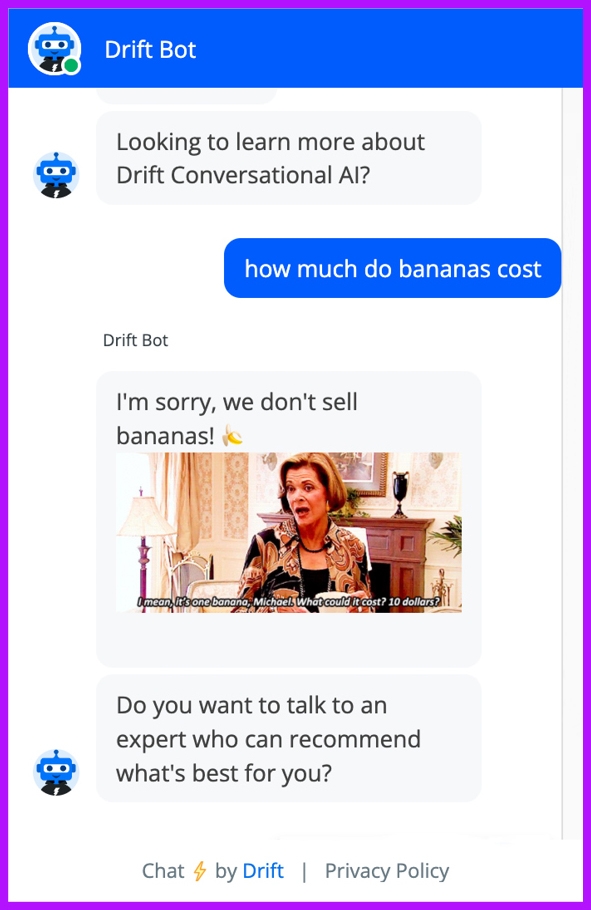
Not only does Conversational AI enable you to drive a higher conversion rate on your website, but it also helps enhance conversations. Our Conversational AI leverages the capabilities of GPT to facilitate better conversations. For example, with AI suggested replies, your reps can stay engaged in live chat by using AI to quickly generate, edit, and send custom responses.
Media Buying
Media buying can get complicated, especially when you’re focused on your bottom line. But agencies and brands can turn to AI-powered software to achieve greater return on investment (ROI) from their paid advertising campaigns.
In fact, many advertising platforms, such as Facebook ads, rely on AI to help customers get better ROI so they will want to keep on spending. Here are some ways AI can help you make the most of your advertising:
- Determine your advertising campaign strategy
- Organize your advertising account structure
- Continuously optimize and update your targeting
- Automatically adjust your bids and budget
- Create and test creatives
Content Creation and Repurposing
When it comes to content marketing, AI offers a lot of potential. Not only is AI able to lay the foundation for new content, but it can also speed up the process of repurposing content.
Say you’ve recorded a podcast with a ton of amazing sound bites. You can use the transcript of that episode as your prompt to generate a blog post with AI. Then, you can convert that blog post into different social media posts to further share the learnings from that podcast.
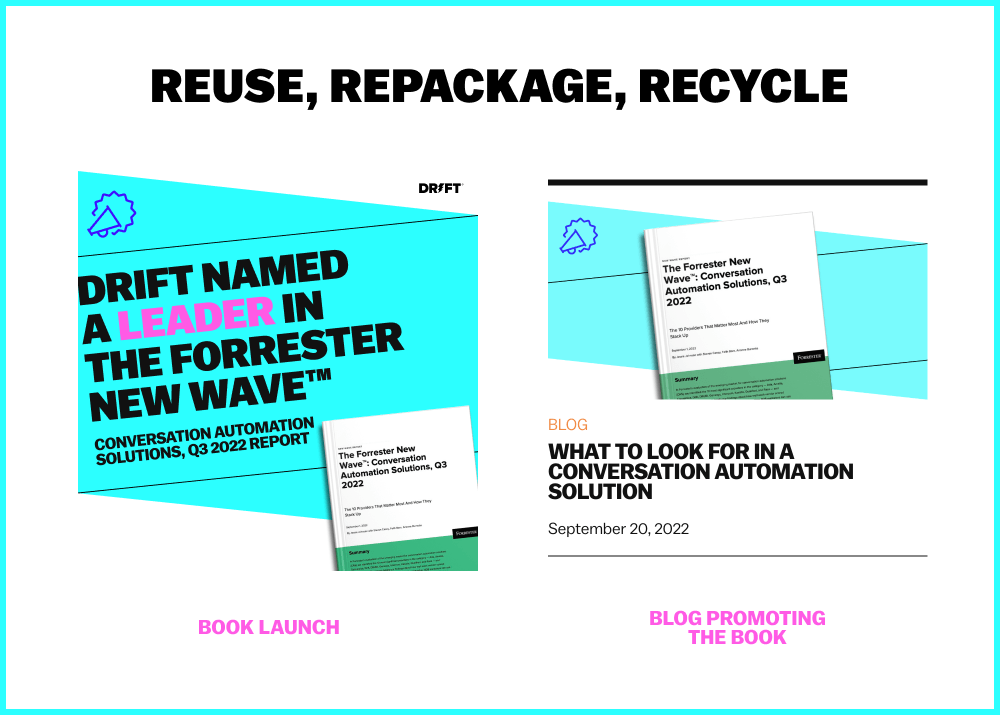
By leveraging AI to create and repurpose content, you can save the time it would take to write all those marketing materials from scratch. Instead, you would be able to generate a solid first draft within seconds.
But generative AI isn’t only limited to written content. More tools are coming to market that will help you repurpose your content for other formats as well (like turning long-form videos into short-form ones.) With these tools, you will easily be able to breathe new life into your existing content.
Data Analysis & Decision Making
It wouldn’t be an exaggeration to say that most businesses are drowning in a sea of data.
The best executives and business leaders make it their job to utilize this data so it doesn’t go to waste. But collecting usable insights takes a lot of time and manpower — both of which marketing teams don't have to spare.
That’s where AI can help. Many digital marketing platforms offer AI-powered analytics that automatically surface actionable insights that allow you to quickly make impactful decisions, like our AI-powered engagement score which helps sales reps prioritize high-intent leads.
Of course, if you have a dedicated team of data scientists within your marketing team, you can also use machine learning programs like Python to source the exact answers that you need to boost your marketing efforts. Either way, AI-powered tools empowers you to understand your data in full so that you can implement marketing campaigns and strategies that you know will drive revenue.
Customer Journey Automation
Your customer journey is likely long and complicated, with customers having to go through multiple layers of steps. And at every step, there are a variety of actions that you will want customers to take to bring them deeper down your funnel.
Marketing AI allows you to automate parts of the customer journey so that people will convert faster. Maybe you want your buyers to attend a webinar, download a free resource, or tell you their top business challenges — you can use AI to trigger those requests at the most relevant times.
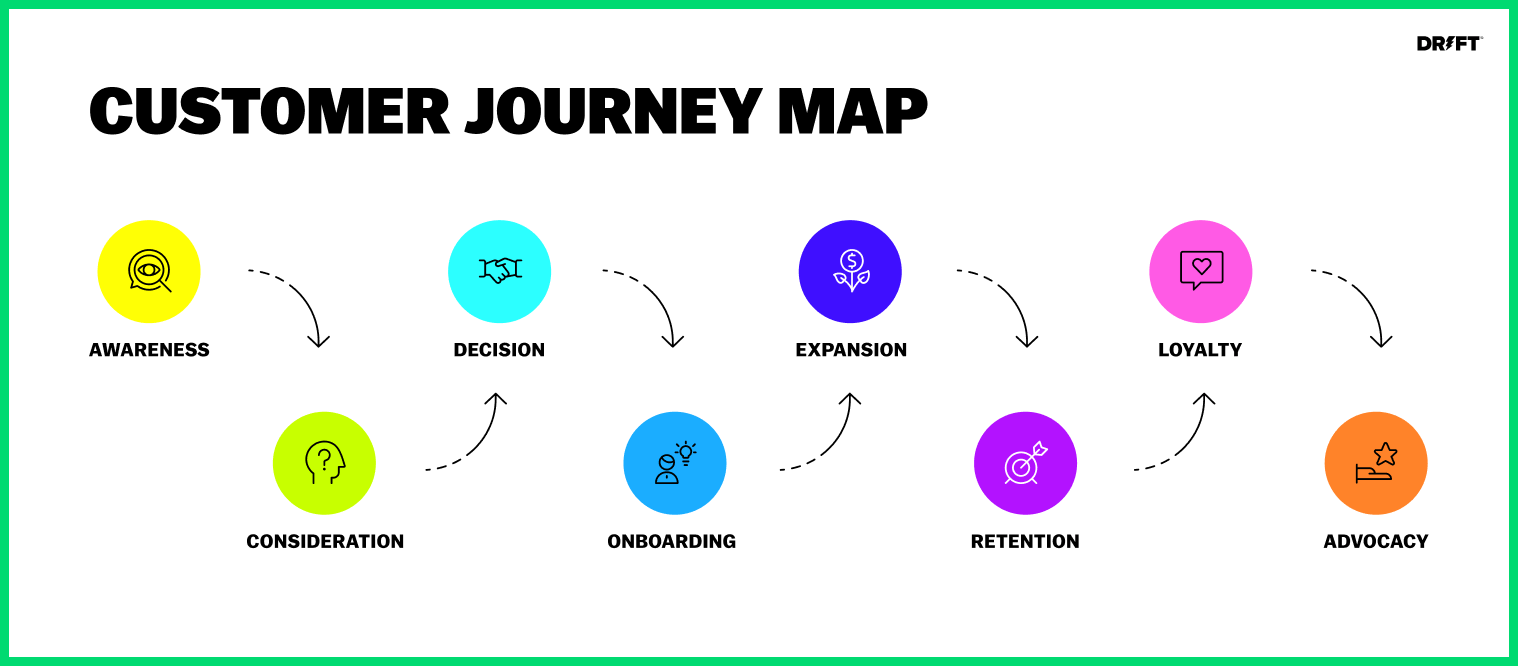
But AI marketing is about more than just triggering sequences. With AI, you can craft campaigns that intuitively adapt to your customer’s needs in real time, so that they are met with a relevant resource or answer at all times. Moreover, AI can help you discover the best target audience for a new campaign or product launch based on all of your available data — which, altogether, makes for a more effective customer journey.
Market & Customer Research
Knowing is half the battle — and that makes research extremely important for marketers.
AI can pore through customer interviews, sales calls, social media content, product reviews, forums, and all sorts of other content to help come up with market trends and insights. With this information, marketers can figure out what customers really think about their brand and products in order to create campaigns that connect and convert.
Benefits of AI in Marketing
Overall, McKinsey estimates that AI can unlock $10 to $15 trillion in value — and for good reason. Here are all the major benefits that AI offers to marketing teams.
Increased Team Productivity and Output
Marketers are excited for what AI can do, especially when it comes to saving time and boosting efficiency. That’s because today’s AI is capable of partially handling dozens of marketing tasks — whether it involves creating content, editing videos, or surfacing ideal audience segments.
Our State of Marketing and Sales AI report found that 74% of marketers expect to use AI to automate a quarter of their tasks within the next five years, with 41% believing they will be automating over half of their tasks with AI.
Of course, all this doesn’t mean that an AI will be taking over your job. It simply means that you will be able to entrust the AI with the repetitive and tedious tasks so that you can focus entirely on the work that requires a human touch.
Better Segmentation & Personalization
As marketing AI gains more traction, marketers will need to start figuring out which jobs will be handled by the humans and which by the robots. But when it comes to audience segmentation, the robots win hands down.
That’s simply because it would take months (or even years) for a human to sift through all of your lead and customer data in order to determine the best target segment for a campaign or promotion — whereas AI can deliver the right target segment in minutes.
Not only does marketing AI provide more effective segmentation, you’re also able to scale your personalization efforts. By utilizing AI, each segment, account, and individual will automatically receive the right messaging at the right time based on the customer's behavior and known interests. As a result, your audience will see your brand as relevant, resonant, and personal — which will make all of your campaigns more likely to succeed.
Improved Customer Experience
By using AI to enhance your marketing, you aren’t just making your team’s lives easier. The improvements that marketing AI offers also translates into a better customer experience.
With better segmentation and instantaneous personalization, your customers will be treated to more one-of-a-kind customer service. So, instead of being given the same messaging and offers as everyone else, all of your customers will have more personalized conversations and receive resources that are relevant to them.
In addition, with intelligent automation, you can serve your customers with even more speed and accuracy. Using AI chatbots, your website visitors can get their questions answered instantly without having to rely on a human rep, which will move them along the sales cycle faster.
In a world obsessed with convenience, even the smallest of upgrades can turn your customers into brand enthusiasts — and AI promises to delight your customers by delivering an experience that is faster, more responsive, and more personalized.
Higher Campaign ROI
Ultimately, marketers are measured by how much ROI they can generate for their company. And one of the biggest benefits of marketing AI is that it generates high returns.
Through improved team performance, campaign personalization, and customer satisfaction, marketing teams can deliver higher ROI on campaigns across a variety of channels, including organic content, paid advertising, email marketing, and more.
Challenges of Marketing AI
While the potential rewards of AI marketing are sky high, the challenges are just as big. If you’re planning on implementing AI into your marketing, watch out these for these common pitfalls:
- Securing buy-in: Some executives, managers, and team members will be all in on AI. Others, not so much. Depending on your industry, you might have to fight a big uphill battle just to try out a new AI solution or feature. So, make sure you come prepared with a solid case for implementing marketing AI.
- Maintaining brand quality: With everyone excited about the seemingly magical powers of generative AI, content creators might end up overlooking off-brand elements, like overly enthusiastic copy or simplistic designs. As you begin to include generative AI in your marketing, make sure your review and approval processes are robust to ensure the AI you’re using isn’t negatively impacting your brand.
- Lack of human resources: AI offers a lot of potential to increase productivity, but it can’t run itself. You’ll need human marketers to set up your automated campaigns, feed prompts into your generative AI, as well as edit and implement content. If you don’t have enough talent on deck to take on new systems, you might struggle to achieve lift-off. Implementing solutions that offer hands-on professional services can help you can get started with AI quicker.
- Upskilling team members: For marketing leaders, a lack of training and education was cited as the top challenge to adopting AI. In order to fill those gaps, you might want to attend special workshops or get external consulting. Or you might be able to receive all of the education you need from the customer success department for your chosen AI marketing software. Either way, make sure that your team members are all on the same page about what your marketing AI does and how it can help them in their day-to-day.
- Privacy and data utilization: Browsers, phone manufacturers, and governments are cracking down on the use of third-party data, which means your AI will have to comply with all data regulations in the regions you operate in. On the plus side, some AI marketing tools rely solely on first-party data. Tools like Conversational Marketing store customer conversations that occur on your website so you can safely use your own data for better personalization and results.
- Prioritizing AI initiatives and solutions: Only 29% of marketing leaders feel confident in their ability to evaluate AI marketing technology — and figuring out what to implement is a major barrier to AI adoption. With so many new AI marketing tools emerging, it’s hard to choose what wil work best for your business. To stay focused, prioritize the biggest problems that your marketing department and customers are facing. Then, rely on customer case studies, testimonials, and other resources to pick the right AI tech for you.
Marketing AI Examples
It’s time to get inspired. Check out all these different manifestations of AI marketing.
1. Reid Hoffman’s Book, Impromptu: Amplifying Our Humanity Through AI
Reid Hoffman, a board member for Microsoft and partner at Greylock, was given early access to GPT-4, the latest version of the neural network machine learning model that was trained on the content of the internet.
As part of this update, GPT-4 was now able to output a maximum of 25,000 words at once — or in other words, an entire book.
He used GPT-4 to write Impromptu: Amplifying Our Humanity Through AI. The book dives into the most advanced applications of generative AI with information on how to give GPT-4 the best prompts possible.
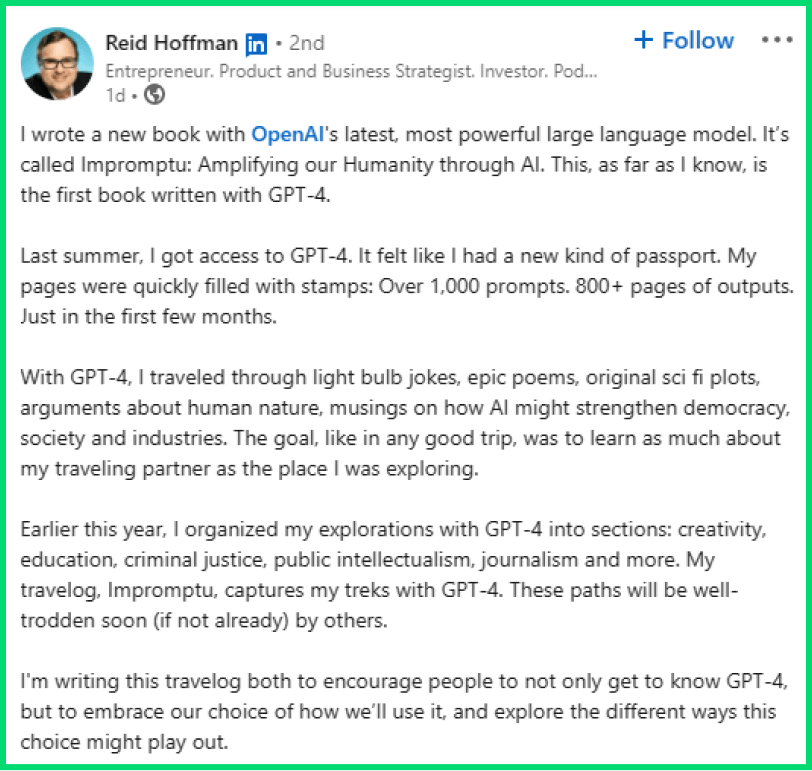
Impromptu is a great example of marketing in action because Reid has used the book to garner attention for OpenAI’s release of GPT-4 to the public. As one of their evangelists, he’s wracked up thousands of engagements and hundreds of thousands of views on his content promoting the book and GPT-4’s capabilities.
Like Reid, ask yourself how you and your brand advocates can use generative AI to create your own lead magnets, generate buzz, and drive awareness with less effort.
2. Product Photography Generated with Flair.ai
What if you could create high-quality photos of your products with just you and your laptop?
With Flair.ai, you can generate product photography in minutes. No expensive photoshoots with backdrops, props, lighting equipment, or cameras required.
Their user-generated gallery offers plenty of attractive, on-brand examples like this one:

You’ll need to upload high-quality photos of your products (either with a white background or no background). Then, you can place those photos in any setting imaginable.
Using images generated with Flair.ai, you can produce all sorts of visual marketing campaigns like email blasts, social media posts, and promotional website banners.
3. Website Personalization
We’re big believers in website personalization. By leveraging first-party data from your website, you can give your buyers and customers a unique site experience with real-time personalization.
For example, we give our returning visitors a warmer welcome by greeting them with, “Nice to see you again!”
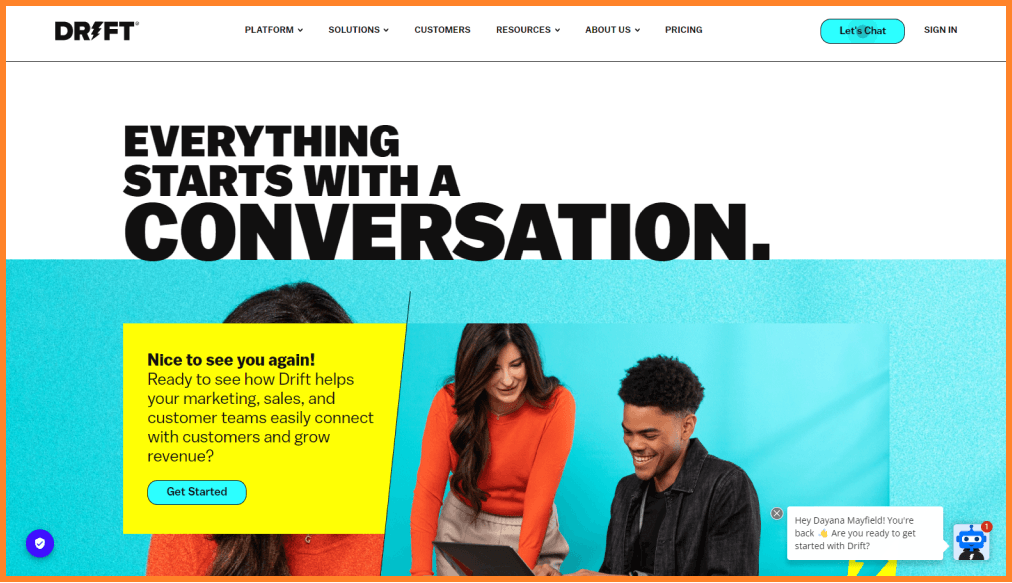
By delivering personalized messaging to your website visitors, you can make your brand more human while setting the stage for a helpful, relevant experience. Using AI, you can automatically personalize content based on all sorts of activity — such as number of sessions, time since last session, web pages visited, purchase behavior, and more.
4. ACUVUE’s Advertising Partnership with Samba TV
Samba TV offers AI-powered omniscreen streaming advertising and analytics.
Samba TV users can opt in to give advertisers their viewing data with 46 million smart devices currently participating. This allows Samba TV to automatically source interest-based data to give advertisers more accurate campaign targeting and continually optimize targeting based on view time and interactions with ads.
Acuvue recently used their platform to target specific audience segments, like 25 to 40-year-old fitness enthusiasts, and experienced a 17% lift in purchase intent.
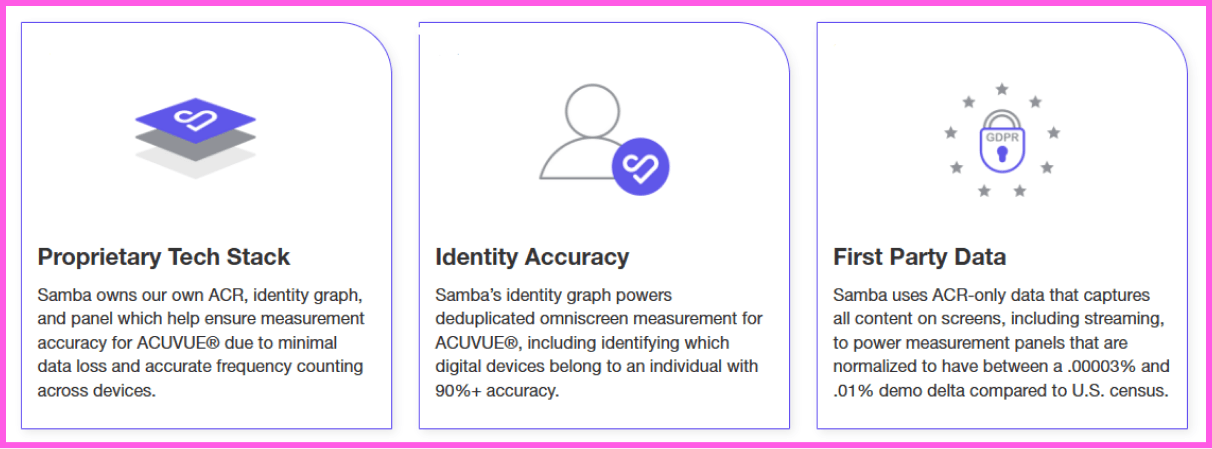
Across every format of advertising, software providers, agencies, and brands are working hard to collect and utilize as much first-party data as possible. So, consider your own media buying strategy: If you're not partnering with platforms that use first-party data to optimize campaigns, now might be the time to start forging those relationships.
Predictions and Trends in AI Marketing
Where are artificial intelligence and marketing headed? What can we expect in the coming years? Check out these predictions for the future of AI marketing.
The Rise of Generative AI within Software Platforms
Have you noticed that many of your favorite tools are adding generative AI capabilities?
Content collaboration platform StoryChief lets you use generative AI to write content briefs. SEO optimization platform Frase offers AI for drafting blogs. And our Conversational AI is now able to automatically suggest replies that your reps can use in live chat.
And this is only the beginning. Expect to see hundreds of different marketing platforms adding AI into the mix. It’ll be up to you to figure out which features are worth your time and which are shiny objects — so, as generative AI becomes more pervasive, make sure that you’re spending your marketing dollars on AI that truly makes a difference.
Time-Saving Tools for Every Marketing Task
In addition to your favorite marketing platforms adding AI to their roster, expect to see niche SaaS solutions popping up for everything under the sun. Think Beatoven’s background music generator and Cleanvoice’s automated podcast editor.
As a marketer, you’re probably all too familiar with those little tasks that ultimately clog up your to-do list. With new AI solutions coming onto the market though, soon there will be specific tools created just to help you check off those tasks so you can focus on doing the work that impacts your bottom line.
The Use of AI for Research and Strategy
At this point in time, many marketers are using AI to automate their customer journeys and complete repetitive work, while very few are using it to set their strategy.
But, as more time passes, you can expect to see research AI get a lot more sophisticated. Already, research AI is making waves in other industries. For example, LoopPanel conducts user interviews for you, analyzes them, and tells you exactly how to improve your UX.
With AI tools, you can make researching and strategizing much easier and faster. So, that’s why you can expect to see AI tools dedicated to customer research and marketing strategy in the very near future.
Emerging Roles and Responsibilities
As marketing AI technology evolves, so do we.
In the next few years, we’re likely to see brand new roles popping up on marketing teams. Perhaps AI marketer, AI marketing manager, AI prompt writer, AI content editor, or even AI wrangler will be the job title of your new work BFF.
Of course, some AI marketing tasks won’t necessitate a whole new hire, so you’ll see changing responsibilities instead. You might see more AI-specific requirements on job listings for social media managers, marketing operations managers, and other roles, where previously AI wasn’t mentioned.
Getting Started with AI Marketing
Artificial intelligence marketing is all any marketer is talking about these days. So many tools, use cases, and capabilities are being released all of the time, that it’s hard to keep up.
We say: Don’t. While you want to stay aware of new technologies, you don’t need to become an expert in all of them.
Instead, you should leverage marketing AI to solve your biggest problems. Are you struggling with team productivity? Are you failing to use data to optimize your campaigns? Is a lack of AI-powered personalization causing leads to fall through the cracks?
Assess your gaps and opportunities to use marketing AI wisely, and save the hype for the AI gurus. Because, at the end of the day, the real key to driving more pipeline and revenue is to deliver an experience that delights your customers and addresses their needs.
If you want to use Conversational AI to proactively engage your customers with relevant, real-time conversations and personalize your website with accurate first-party data, book a demo today.
